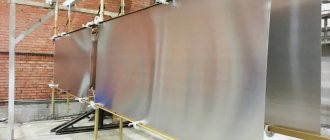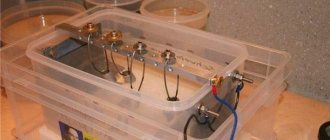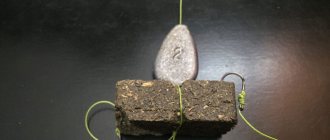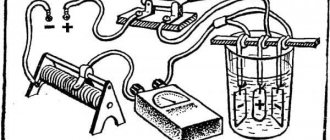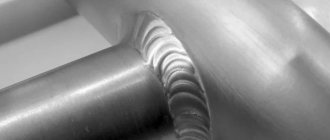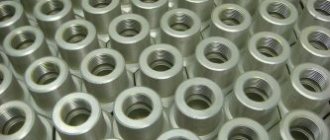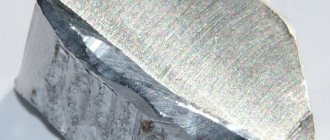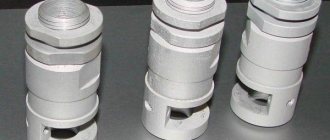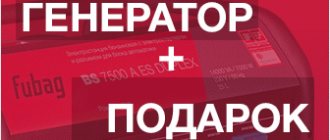Aluminum objects are widely used in everyday life. Over time, they lose their attractiveness. Painting the aluminum will help restore it. You can do this yourself, but there are some nuances in the work. When the material comes into contact with air, it oxidizes and a plaque that is difficult to remove appears. To ensure that the dyeing results are not negative, the paint lasts a long time, all actions are performed according to the instructions.
If in production for applying paint to aluminum, conditions are created so that there is no oxidation of it, components are introduced into the composition of the CM, then painting the material at home will work if you use the advice of craftsmen who have gone through all the stages of preparation and got a good result.
Self-painting with anodizing
Materials are prepared before painting aluminum using anodizing and aniline:
- baking soda and ash salt - for electrolyte solution;
- aluminum container;
- power point;
- sandpaper sheet;
- vinegar 9% and aniline;
- degreasing agent.
The electrolyte is being prepared. A solution of salt (9 parts) and baking soda (1 part) is mixed in a glass container.
Before painting aluminum, it is sanded with a sheet of sandpaper and degreased. An object is immersed in a liquid. You cannot touch it with your hands.
The electrolyte solution is poured into an aluminum container. The product to be painted is immersed in it. The power supply point is connected to it with the positive pole, and to the container - with the negative pole.
Everything is left in this state for 2 hours.
Next, aniline CM is used. Its components: liquid - 1 liter, vinegar, 9% - 1 ml, dye - 15 g. all components are mixed and heated to 75-80 degrees. Painting an aluminum profile immersed in the solution will take 15 minutes. The longer the item is in the solution, the richer the shade will be.
Varieties of suitable paints for painting
There are four types of aluminum paints that meet the requirements to varying degrees. Coatings have their pros and cons, so when choosing, you should take into account the purpose of the part to be painted.
Aniline
The main area of application of aniline dyes is the textile industry. They are available in powder and liquid form.
Aniline is a toxic substance, but after drying the product is safe for health.
Epoxy
Resins form the strongest compounds.
Durable epoxy paints typically consist of two components—a base compound and a volatile hardener.
Acrylic
The paint base is a polymer that adheres firmly to the surface.
Aerosol paints are easy to use. The sprayer can be used to paint hard-to-reach corners and small elements. Acrylic paints are also more varied in color. White compositions can be colored.
Powder
Another advantage of powder coating is the absence of toxic emissions from the composition or solvent, more economical consumption. Most often, to fix the dye, parts are subjected to heat treatment in a special heat installation, so the technology cannot be reproduced at home.
Techniques without anodizing
At home, painting aluminum profiles is carried out using other practice-tested methods. For this you will need materials:
- sandpaper sheet;
- primer composition;
- degreaser;
- epoxy or acrylic CM for metal. For self-use, an aerosol formulation is recommended.
The surface is sanded, degreased, coated with primer and CM. The product is ready for use after 6 hours. Additionally, painted aluminum is varnished for protection.
Acid primer technology
To make painting an aluminum profile less problematic, new surface treatment products are being developed and produced that enhance the adhesion of CM to the surface. At the car market you need to purchase a special acid primer, regular and spray paint.
Before painting aluminum, the metal is cleaned, degreased, and covered with 2 layers of acid primer. A regular primer is applied to the dried base, powdering it so that it is transparent. This is aluminum painting, technology using aerosol compositions. Therefore, the dye will be aerosol.
Enamel paint coating
For the simplest method of painting metal, you need: sandpaper, degreaser and enamel paint. It is cleaned, degreased and painted with special enamel. KM is applied strictly according to the instructions prescribed by the manufacturer on the container. Such conditions ensure that enamel paint for aluminum will adhere to high quality.
Adviсe
Recommendations from experts will help you obtain a high-quality painted surface:
- The even distribution of the dye released by the can will be ensured by frequent, strong shaking. The action provokes constant mixing of the components, acquiring homogeneity.
- Before applying paint, clean the nozzle to ensure an even spray. Turning the can upside down, press the spray until the spraying liquid becomes clear.
- It is recommended to sand the surface with coarse sandpaper. 600 material number will do an excellent job of treating the surface before applying the last protective layer.
Choosing any method, following the recommendations, technology, sequence of actions will allow you to obtain a high-quality painted part, protected from oxidative processes. For work, it is important to choose high-quality materials, paint and varnish products, and degreasing solutions, then the result will be positive.
Powder coating technique
Aluminum powder paint is used if there is access to special thermal equipment.
The old layer of CM is removed with a special solvent. The powder composition is applied. Accuracy in work is the key to uniform surface coverage. The color will then be rich and lasting. The appearance of the part at this stage will be far from perfect.
The aluminum part is subject to heat treatment: it is placed in a special industrial chamber. The covering layer melts under the influence of high temperatures and spreads evenly on the surface.
The absence of such a heat chamber at home reduces the possibility of using powder paint painting techniques.
How to blacken aluminum at home - Property Protection
The essence of the anodizing process is the build-up of an oxide coating, which on aluminum and its alloys performs a protective function against environmental influences. Another name is anodic oxidation. In addition, oxidation is used to improve the aesthetic appearance of products.
Surface defects are eliminated - small scratches, small chips. You can imitate coating with precious metals or increase adhesive properties. The coating can be applied not only at work, but also at home.
Anodizing aluminum at home is very popular among DIYers. In products subjected to anodic oxidation, the durability of the protective coating increases.
General information about anodizing technology
Aluminum anodizing technology is similar to galvanic processing. The deposition of solution oxide ions on the workpiece occurs in a liquid electrolyte at high or low temperatures. The use of a heated solution is possible in industrial installations, where it is possible to carefully control and regulate voltage and current in automatic mode.
At home, they usually use the cold method. This method is quite simple, does not require constant monitoring, and the equipment and consumables are available. To prepare the solution, you can use the electrolyte used in lead car batteries. It is sold in every auto store.
The high strength of the protective oxide film depends on its thickness, which is obtained at home by processing in a cold solution. The increase is made by stepwise regulation of the operating current.
Oxidizing aluminum black is referred to as color anodizing. Black color is obtained in two stages. First, a colorless film is applied electrolytically, and then the workpiece is placed in a saline solution of acids. Depending on the acid, the color can range from pale brass to deep black. Black aluminum is widely used in construction and decoration.
how to blacken aluminum?
Each of us has come across such a definition as anodizing, which applies, in particular, to aluminum products.
This metal in its pure form or its alloys are well suited for making various crafts, which is used by many home craftsmen. The metal is light in weight, has high strength and is easy to process.
But most importantly, it is resistant to corrosion. Many craftsmen anodize aluminum at home.
But why is this done, since the material itself is quite durable and looks good? However, despite all the advantages, it also has weaknesses.
And its main drawback is its interaction with air, resulting in an oxidation reaction. This leads to the formation of plaque, which significantly complicates the painting of products. In addition, the type of aluminum itself is far from perfect. It is for this reason that aluminum undergoes an anodizing procedure.
According to GOST standards, anodizing is called anodic oxidation. The main result of the electrochemical process of aluminum anodization is the formation of a more durable oxide coating.
The fact is that during the oxidation of the metal, a protective film is formed on its surface, which is easily damaged.
The whole point of anodizing is to strengthen this film, and not to apply any coating, which usually happens when chrome or galvanizing products.
The film is formed from aluminum itself. The process is very similar to another technology - blueing of metals by oxidation. Not only aluminum products are subjected to anodization; magnesium and titanium are also subject to such protective treatment if necessary.
What can anodizing aluminum do for metal at home? First of all, the ability to resist corrosion will increase significantly.
A stronger oxide protective film will last a very long time and will not peel off. When it comes to aniline dyes, there are many options.
In addition, anodizing can be performed in different ways:. At home, the cold method of anodizing aluminum is often used.
Many companies that offer services in this area also mainly specialize in this method.
Among the advantages of anodizing aluminum at home using this method is the production of a thicker protective coating, which increases resistance to corrosion.
Only processed products are difficult to process with organic paint materials. Although the metal will acquire color in any case, and the shade can be olive, grayish or black. The result of solid anodic oxidation is a particularly strong protective film. Largely due to this, this technology is successfully used on a huge scale:.
A feature of hard anodizing of aluminum is the use of several electrolytes at once. In addition to the use of sulfuric acid, a number of other analogs are also involved: oxalic, sulfuric, citric, tartaric and boric. And this is only during one process in which the current density gradually increases. The essence of this method is to change the color of the metal.
In this case, 4 main methods can be distinguished:. As you can understand, color anodic oxidation allows you to acquire a new shade of color, depending on your preferences.
In industry, anodizing of metals is carried out using sulfuric acid, but anodizing aluminum at home using it is extremely undesirable due to the release of a large amount of gas.
Once the slightest spark is formed, sad consequences cannot be avoided.
The technique itself remains unchanged, but soda is used instead of acid. Aluminum containers are needed directly for the process itself. The other two are needed for preparing solutions, for which glass or plastic products are useful. To prepare solutions for anodizing aluminum with your own hands, soda and salt, you only need warm distilled water.
Features of powder coating
Before applying powder paint, the products are treated with a special chemical composition, and then they are painted with a substance that has a powder consistency.
Next, in the heat chamber, the work is done by high temperature, under the influence of which the powder melts, giving a reliable polymer coating that can serve for many years.
Modern offers from manufacturers
Manufacturers are developing coatings of different compositions, which are used taking into account painting methods, the required protective and aesthetic qualities of an aluminum structure.
CMs for metal with direct adhesion to the base have been developed. Using them reduces painting time. Aluminum painting begins without pre-treatment with primers. Due to this, less time is spent on the entire process. Manufacturer LECHLER, Italy produces such compositions. Their products with strong anti-corrosion protection for aluminum structures operating in aggressive environments are in demand: Epoxy anti-corrosion primer EPOFAN PRIMER 29175 (LS175) is applied in one layer, followed by a two-layer coating of gloss paint for metal ISOLACK 29144 (LS144) or matte paint for metal ISOLACK PUR OPACO 29141 (LS141). A coating resistant to mechanical and chemical influences is formed. Over a long period of operation, the brightness of the color is maintained under the influence of external factors. Orders are accepted by Industrial Coating Systems LLC in St. Petersburg, contact by mail or 8-812-902-502-8 - placing orders, selecting paint from the RAL catalog (for example, in tandem with epoxy anti-corrosion primer with zinc phosphate 5204 in 1 layer is used Metal paint 2285 in pastel colors or in silver, gold or metallic.
CMs for metal of the LECHSYS brand allow you to work using the technology: “wet” application.
How to blacken aluminum at home
Each of us has come across such a definition as anodizing, which applies, in particular, to aluminum products.
This metal in its pure form or its alloys are well suited for making various crafts, which is used by many home craftsmen. The metal is light in weight, has high strength and is easy to process.
But most importantly, it is resistant to corrosion. Many craftsmen anodize aluminum at home.
But why is this done, since the material itself is quite durable and looks good? However, despite all the advantages, it also has weaknesses.
And its main drawback is its interaction with air, resulting in an oxidation reaction. This leads to the formation of plaque, which significantly complicates the painting of products.
In addition, the type of aluminum itself is far from perfect. It is for this reason that aluminum undergoes an anodizing procedure.
According to GOST standards, anodizing is called anodic oxidation. The main result of the electrochemical process of aluminum anodization is the formation of a more durable oxide coating.
The fact is that during the oxidation of the metal, a protective film is formed on its surface, which is easily damaged. The whole point of anodizing is to strengthen this film, and not to apply any coating, which usually happens when chrome or galvanizing products. The film is formed from aluminum itself.
The process is very similar to another technology - blueing of metals by oxidation. Not only aluminum products are subjected to anodization; magnesium and titanium are also subject to such protective treatment if necessary.
What can anodizing aluminum do for metal at home? First of all, the ability to resist corrosion will increase significantly. A stronger oxide protective film will last a very long time and will not peel off.
In addition, there are a number of advantages that anodic oxidation technology provides:
- Smoothes the surface of aluminum products, that is, hides some defects (scratches and pinhole damage, chips, stripes) and makes the metal uniform.
- Paint coatings adhere better to such metal due to the acquisition of a matte surface.
- Anodized aluminum profiles have improved protective properties.
- Color anodizing of aluminum gives the metal more attractive features.
- Large thickness of protective film.
- Possibility for various imitation - silver, gold, pearls, etc.
When it comes to aniline dyes, there are many options. In addition, anodizing can be performed in different ways:
- cold;
- hard;
- colored.
Let's look at them briefly below.
Cold anodizing
At home, the cold method of anodizing aluminum is often used. Many companies that offer services in this area also mainly specialize in this method. The operating temperature range is from -10 to +10 degrees, which is why the technique is called cold.
Among the advantages of anodizing aluminum at home using this method is the production of a thicker protective coating, which increases resistance to corrosion.
Only processed products are difficult to process with organic paint materials. Although the metal will acquire color in any case, and the shade can be olive, grayish or black.
Hard Anodizing
The result of solid anodic oxidation is a particularly strong protective film. Largely due to this, this technology is successfully used on a huge scale:
- industry;
- aircraft manufacturing;
- automotive industry;
- construction.
A feature of hard anodizing of aluminum is the use of several electrolytes at once. In addition to the use of sulfuric acid, a number of other analogs are also involved: oxalic, sulfuric, citric, tartaric and boric. And this is only during one process in which the current density gradually increases.
The strength of the protective coating is increased due to structural changes.
Color anodizing
The essence of this method is to change the color of the metal. In this case, 4 main methods can be distinguished:
- Adsorption - products are immersed in a special bath or in a dye solution heated to the required temperature.
- Electrolytic (black anodizing of aluminum) - initially a colorless film is obtained, after which the aluminum products are dipped into an acidic saline solution. Black is a common color used in construction, but a slightly bronzed tint can also be achieved.
- Interference - the technique is similar to electrolytic, but in this case a special reflective layer is created, due to which the color palette is much larger.
- Integral - the essence of this method is to mix the electrolyte and organic salts.
As you can understand, color anodic oxidation allows you to acquire a new shade of color, depending on your preferences.
Home technology
In industry, anodizing of metals is carried out using sulfuric acid, but anodizing aluminum at home using it is extremely undesirable due to the release of a large amount of gas. Once the slightest spark is formed, sad consequences cannot be avoided. The technique itself remains unchanged, but soda is used instead of acid.
But first you should prepare the “equipment”:
- several baths;
- wiring;
- Battery or rectifier (current source);
- rheostat;
- ammeter.
Aluminum containers are needed directly for the process itself. The other two are needed for preparing solutions, for which glass or plastic products are useful.
Preparation of an alternative electrolyte
To prepare solutions for anodizing aluminum with your own hands (soda and salt), you only need warm distilled water. The components for mixing are kept in a ratio of 1 to 9 (soda or salt - water).
The solutions are mixed well, after which they need to brew. And after some time, they need to be poured into other containers, and try to prevent the ingress of soda sediment. The final result of the procedure will depend on the purity of the solution.
Before the part is processed, it must be cleaned, if necessary, the surface must be sanded and degreased. The film thickness is no more than 0.05 millimeters, so it cannot hide visible defects.
Immediately before the process, you need to mix the prepared solutions in one container.
What affects the effectiveness of dyeing?
All actions for preparing and painting aluminum structures will be effective if certified materials are used in the work. This is necessary both for self-dying and for specialized companies. Powder dyes from the international concern based in the Netherlands, Akzo Nobel, and a brand from France, Bichon, are in demand on the Russian market.
If you contact a company that organizes a full cyclical process, the painting of the aluminum profile will be done quickly and with the highest quality. Price for painting aluminum profiles according to the price list: from 189 rubles per 1 m2.
Many companies that sell paints and varnishes for metal offer them in an assortment of colors. Moskovskaya offers a wide selection of paints according to the RAL catalog. There is contact by phone or by mail
Features of the material
An oxide film forms on the surface of aluminum, like any metal. On aluminum it has the following features:
- the surface is covered with a thicker layer than on other metals, regardless of the processing method and environmental conditions;
- the film prevents moisture from reaching the surface, so water-based paints do not adhere to aluminum;
- oil paint also peels off - slower from smooth parts, faster from shaped parts.
Surface particles of the material come into contact with oxygen from the atmosphere. As a result, aluminum oxide is formed, covering the product with a dense layer. The metal appears to be dusted with white dust and is slightly rough to the touch.
